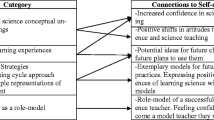Abstract
This study examines the self-efficacy of one preservice elementary school teacher (Kasey) during and after her participation in Science in Childhood Education—a 16-week, elementary preservice science methods course. The case study of this teacher is situated in the context of the class as a whole. This is accomplished through interviewing the one teacher and examining artifacts and observations of the entire class. The results of these experiences are studied to determine what changes have taken place in the participants’ self-efficacy in science teaching as well as the one preservice teacher in greater detail. Because self efficacy is influential to student learning, the results of this study have significant implications for the design of elementary teacher education programs and the support of elementary teachers in teaching science.


Similar content being viewed by others
Notes
All names are pseudonyms.
Readers interested in having descriptions of these assignments may contact the second author.
References
Bandura, A. (1997). Self-efficacy the exercise of control. New York: W. H. Freeman and Company.
Carrier, S. J. (2009). The effects of outdoor science lessons with elementary school students on preservice teachers’ self-efficacy. Journal of Elementary Science Education, 21(2), 35–48.
Cooke, N., & Mensah, F. M. (2009). The emergent teacher voice: Identity development of preservice elementary teachers. Paper presented at the ASTE Annual International Conference. Hartford, CT.
Crotty, M. (1998). The foundations of social research. London: SAGE Publications.
Dembo, M. H., & Gibson, S. (1985). Teachers’ sense of efficacy: An important factor in school improvement. The Elementary School Journal, 86(2), 173–184.
Guba, E. G., & Lincoln, Y. S. (1989). Fourth generation evaluation. Newbury Park, CA: Sage.
Howes, E. V. (2002). Learning to teach science for all in the elementary grades: What do preservice teachers bring? Journal of Research in Science Teaching, 39(9), 845–869.
Koballa, T. R., & Glynn, S. M. (2007). Attitudinal and motivational constructs in science learning. In S. K. Abell & N. G. Lederman (Eds.), Handbook of research on science education (pp. 75–102). Mahwah, NJ: Lawrence Erlbaum Associates, Publishers.
Krajcik, J., Czerniak, C., & Berger, C. (1999). Teaching children science: A project-based approach. Boston: McGraw-Hill College.
Langer, J. A., & Applebee, A. N. (1987). How writing shapes thinking: A study of teaching and learning. Urbana, IL: National Council of Teachers of English.
Lederman, N. G. (1992). Students’ and teachers’ conceptions of the nature of science: A review of the research. Journal of Research in Science Teaching, 29(4), 331–359.
Lederman, N. G., Lederman, J. S., & Bell, R. L. (2004). Constructing science in elementary classrooms. Boston: Pearson Education.
Matsen, B. (2005). Go wild in New York City. Nurture New York’s nature. Washington, DC: National Geographic Society.
Mensah, F., Catlin, J., O’Neill, T., & Johnson, V. (2009). Initiating school-university science partnerships for the preparation of elementary teachers in an urban middle school. Interactive Paper-Poster presented at the ASTE Annual International Conference. Hartford, CT.
Merriam, S. B. (1998). Qualitative research and case study applications in education. San Francisco: Jossey-Bass.
Moore, F. M. (2008). Preparing preservice teachers for urban elementary science classrooms: Challenging cultural biases toward diverse students. Journal of Science Teacher Education, 19(1), 85–109.
O’Loughlin, M. (1992). Rethinking science education: Beyond Piagetian constructivism toward a sociocultural model of teaching and learning. Journal of Research in Science Teaching, 29(8), 791–820.
Parker, J., & Heywood, D. (2000). Exploring the relationship between subject knowledge and pedagogic content knowledge in primary teachers’ learning about forces. International Journal of Science Education, 22(1), 89–111.
Roth, K. J. (2007). Science teachers as researchers. In S. K. Abell & N. G. Lederman (Eds.), Handbook of research on science education (pp. 1205–1259). Mahwah, NJ: Lawrence Erlbaum Associates.
Russell, T., & Martin, A. K. (2007). Learning to teach science. In S. K. Abell & N. G. Lederman (Eds.), Handbook of research on science education. Mahwah, NJ: Lawrence Erlbaum Associates.
Sarason, S. B. (1996). Revisiting “The culture of school and the problem of change”. New York: Teachers College Press.
Shulman, L. S. (1986). Those who understand: Knowledge growth in teaching. Educational researcher, 15(2).
Smith, D. C., & Anderson, C. W. (1999). Appropriating scientific practices and discourses with future elementary teachers. Journal of Research in Science Teaching, 36(7), 755–776.
Strauss, A., & Corbin, J. (1998). Basics of qualitative research: Techniques and procedures for developing grounded theory. Thousand Oaks, CA: Sage.
Tilgner, P. J. (1990). Avoiding science in the elementary school. Science Education, 74(4), 421–431.
Author information
Authors and Affiliations
Corresponding author
About this article
Cite this article
Gunning, A.M., Mensah, F.M. Preservice Elementary Teachers’ Development of Self-Efficacy and Confidence to Teach Science: A Case Study. J Sci Teacher Educ 22, 171–185 (2011). https://doi.org/10.1007/s10972-010-9198-8
Published:
Issue Date:
DOI: https://doi.org/10.1007/s10972-010-9198-8



